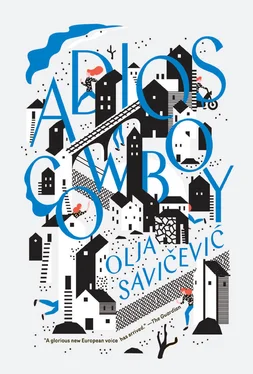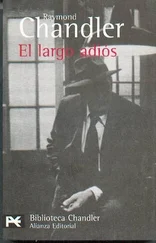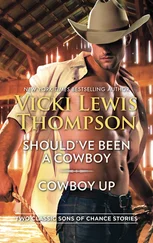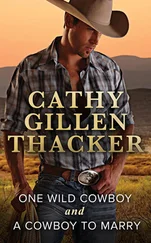When the women picking olives, with their olive eyes and olive skins, catch sight of this freshly shorn head out of an anatomical atlas moving above the bushes, they feel like holding it in their laps or at least passing their open hands over the short haircut — the younger ones put their fingers in their mouths and whistle.
Malicious people say that Angelo is a gigolo, but he is not a mannequin from a catwalk, a talking dildo, a toy-boy for women tourists, today he is, take a good look — the prince of the flatlands.
He always keeps to himself, in company he is usually silent unless someone asks him something, but everyone agrees that he has presence, everyone pats him on the back and gladly treats him to a whiskey in the bar of the La Vida Loca restaurant or a beer in the Last Chance.
He is a serial lover, a troubadour and adornment of the world, a being harmless as a butterfly, a sweet birdbrain with firm limbs, fragrant consolation for any girl who needs it.
Not intending any good, let alone harm, he used an ice cream spoon to scoop out the hearts of wise virgins, and made the foolish a little more sensible. They opened their wallets, their legs, and their mouths and later accused the young man of having a stopwatch instead of a heart.
But today it’s different, today he’s the prince of the flatlands as he steps through the fields in his blue tuxedo, he sheds the invisible jewelry that his lovers have hung around his neck, the bangles they clasped round his wrists; the wind has aired the scent of women’s armpits and heavy perfumes from his clothes, cleared away the spit, tears, liquid powder, lubricants with banana extract, and the sourness of vulvas from his skin.
He’s young enough that it’s still possible for an ordinary morning shower to wash him clean.
He forgets the exclamations of joy and screams, the contractions of thighs, the hot breath on his neck and the sobbing, the silver and pink vibrators, the brown, pinkish, and blond clitorises, the stickiness of two bodies colliding and the touching battle of women to reach orgasm and “love me, please” and “come on, please” and all in vain.
He forgets the game as though he had switched off a porn film on the monitor and washed his dick in lavender.
As soon as he showers, shaves, puts on a clean T-shirt, the women and girls evaporate, with their moaning and weeping, and he finds their tears obnoxious.
He fantasizes about a great career and a great love.
That’s why he’s striding along like a cockerel, look at him, full of himself, audacious.
And now he’s already near the bridge.
Out of superstition, he never comes this way, unless he has to — it was here that Daniel, Rusty’s brother, threw himself under a train.
Whenever she goes to the cowboys, Maria doesn’t go across the prairie, over the fields, she scampers around the other way, over the railway track, through the undergrowth, avoiding the streams overgrown with brambles, agaves and the thorns of wild roses in which children sometimes find the bones of dead occupiers.
She tears her skirt with her fingers if it gets in her way, if it prevents her from stepping over a dry stone wall or jumping a fence.
She’s not a mountain nymph from one of her pa’s folk poems, but a dragon.
After she passes under the bridge, from whose concrete vault dirty slime drips as from a wound, she turns to see the rock from which Daniel, Rusty’s late brother, is watching her.
Her relations called him Cornboy, but she was drawn to him as to a flame.
At one time, whenever she caught sight of him on the rock, she would quickly arrange her hair, caress her breasts, rub between her legs, purse her lips, and smirk at him.
Or she would yell at him at the top of her voice.
Or else she would squat and rock on her heels, her head between her knees.
Daniel died in his eighteenth year, jumping from that bridge under an express train.
She had looked for him in vain the whole of the preceding evening and a good part of that day. She found the place in the crushed grass where he had lain, damp with hoarfrost, and traces of the blood that had gushed out of his torn and broken limbs, through his nose and mouth.
She sat there until some inquisitive railway-track children appeared. Then she took herself off home with Daniel’s school-bag on her shoulder. She had found it in the tunnel under the highway, and now it was hers. It was hers, wasn’t it?
Mathematics 4; L’Italiano per Lei ; a sandwich, which she immediately ate; and a propelling pencil.
Maria often climbs onto the bridge and looks at the Settlement that is swallowing the golden grass, the olive groves clambering up into the bare hills and the seagulls flying in from the rubbish dump and from the direction of the slaughterhouse; the vineyards sprayed with Bordeaux mixture, poisonous and a childish color, in which dark grapes grow, and dog-rose bushes full of hips and thorns.
They had run across this railway track countless times. The track was the frontier in times of war, just this place beside the bridge where the St. Andrew’s cross is and trains whistle as they pass. They were short battles; ambush attacks.
In the times of peace and privilege brought by good weather, together with their enemies, her Iroquois relatives stole bitter cherries in the fields and searched around the pylon for telephone wires that they would use to make bullets for their catapults. Or else they lowered themselves down into the cave, a closed quarry that served as an illegal garbage dump, and there they found foreign newspapers with smooth shiny pages and gala advertisements. That’s how the afternoons usually passed.
They laid their ears on the tracks and listened to hear whether a train was coming.
Daniel always stayed longest, until the sirens went, until sparks started to leap on the rails from the train’s brakes.
The other boys didn’t let Maria onto the track.
Daniel sometimes told her to get lost, but sometimes let her come near.
Maria lays her head on the track: on her ear and temple she feels ice or red-hot metal, depending on the season and the time of day.
This is the time of impending death, soon the plants will wither and the bumblebees and other insects are already turning onto their backs as they fly.
She listens to the underground shifting beneath the surface of the soil — down there nothing has changed. Under the earth there is abundant life and death: tubers and bulbs turn into humus and a mole scratches under its crisp crust, ants grind grains of red soil into friable granules, and in the deeper layers fat white worms munch the hearts of the dead, an underground stream bursts its way through the clay; in the dense, saturated darkness silver and gold veins explode, minerals crackle, mandrake roots scream, while dead occupiers rearrange their bones.
Everything that falls onto the earth becomes nourishment, which someone on the underside of the pavement reheats, melts, and sucks up through little straws.
If you don’t believe this, ask yourself where all those fruits and large or small animal corpses, which no one collects or buries, disappear.
And if you still don’t believe it — leave a dead dog in a field and in sixty days you will find only a dry tail. That’s why Maria listens and never lies on the earth for long.
Out of superstition, Angelo never passes underneath the bridge, unless he really has to; he avoids it. Daniel, Rusty’s brother, threw himself under a train there. The boy was a depressive, fuck him, thinks Angelo.
Since then, many of his former mates with whom he had plundered the high roads the year he returned to the Settlement from America had perished: Ear, Tiny, and the younger Barić. The whole secondary-school gang is now rotting under the black earth. Including Daniel, who had once been part of their team, until they began to chase him through the town.
Читать дальше












